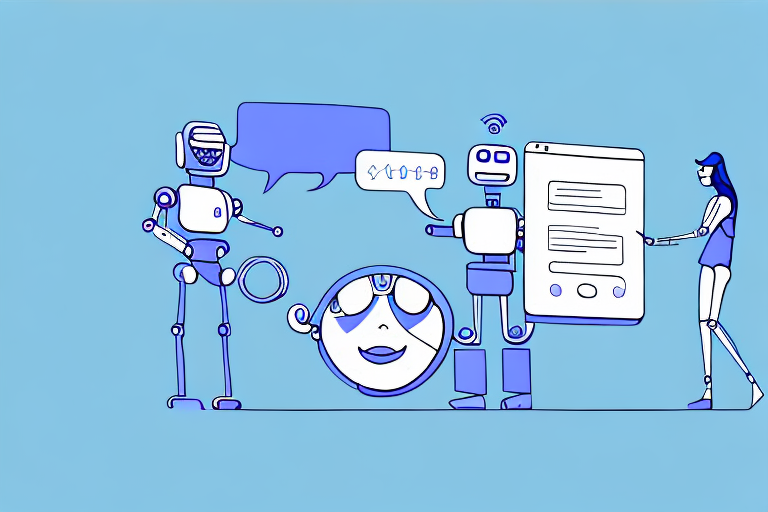.svg)
The Role of Chatbots in Lead Generation: Automating and Qualifying Leads
.svg)

In today's digital age, businesses face the constant challenge of generating leads and converting them into customers. This process can be time-consuming and resource-intensive, requiring a significant investment of both time and money. However, with the advent of chatbot technology, lead generation has become more efficient and effective than ever before. Chatbots help automate and qualify leads, streamlining the entire process and improving the overall customer experience.
1. Introduction to Chatbots in Lead Generation
Before diving into the specifics of chatbots in lead generation, it's important to understand what chatbots are and why lead generation is crucial for businesses.
In today's digital age, businesses are constantly looking for innovative ways to attract and convert potential customers. This is where chatbots come into play. Chatbots are computer programs designed to simulate conversation with human users. They use artificial intelligence (AI) and natural language processing (NLP) to understand and respond to user queries. Chatbots can be deployed on various platforms, including websites, messaging apps, and social media platforms.
What are chatbots?
Chatbots have become increasingly popular in recent years due to their ability to provide instant and personalized customer support. They are like virtual assistants that are always ready to assist customers, no matter the time or day. By leveraging AI and NLP technologies, chatbots can understand and interpret user queries, providing relevant and accurate responses.
Imagine a scenario where a potential customer visits a website and has a question about a product or service. Instead of having to search through pages of information or wait for a customer service representative to respond, the customer can simply engage with a chatbot. The chatbot will understand the query and provide an immediate response, saving the customer time and effort.
The importance of lead generation in business
Lead generation is the lifeblood of any business. It is the process of attracting and converting potential customers into leads. These leads are individuals or businesses that have shown interest in a product or service and have provided their contact information.
Lead generation is an essential component of any business's marketing and sales strategy. Without a steady stream of qualified leads, businesses struggle to grow and thrive. By generating leads, businesses can build a database of potential customers whom they can nurture and convert into paying customers.
Chatbots play a crucial role in automating and streamlining lead generation, making it more efficient and effective. With their ability to engage with prospects, answer their questions, and gather relevant information, chatbots can help identify and qualify leads faster than traditional methods.
Increased efficiency and productivity
One of the main benefits of using chatbots in lead generation is the significant improvement in efficiency and productivity. Chatbots can handle multiple leads simultaneously, without the need for human intervention. This means that businesses can engage with a larger number of potential customers at any given time.
Imagine a sales team trying to handle multiple inquiries from different prospects. It can be overwhelming and time-consuming. However, with chatbots, businesses can automate the initial engagement process, allowing the sales team to focus on high-value activities such as closing deals and building relationships.
Furthermore, chatbots can gather relevant information from prospects, such as their contact details and specific needs or preferences. This information can then be used to personalize follow-up communications and tailor offerings to individual prospects, increasing the chances of conversion.
Improved customer experience
Chatbots provide an enhanced customer experience by offering instant and accurate responses to customer queries. They are available 24/7, ensuring that no lead goes unanswered. This round-the-clock availability is particularly beneficial for businesses with a global customer base or customers in different time zones.
By promptly addressing customer concerns, chatbots help build trust and engagement. Customers appreciate the convenience and efficiency of interacting with a chatbot, as it eliminates the need to wait for a human response. This positive customer experience can lead to increased customer satisfaction and loyalty, ultimately driving business growth.
Cost-effective lead generation
Another advantage of using chatbots in lead generation is the cost-effectiveness. Chatbots require a one-time investment in development and implementation, with minimal ongoing maintenance costs. Compared to traditional lead generation methods that involve hiring additional sales personnel or running extensive marketing campaigns, chatbots offer a more budget-friendly option.
Additionally, chatbots can handle a high volume of leads without the need for additional human resources. This scalability allows businesses to generate leads at a fraction of the cost compared to traditional methods. With the ability to automate repetitive tasks and engage with prospects at scale, chatbots offer a cost-effective solution for lead generation.
In conclusion, chatbots have revolutionized the way businesses approach lead generation. With their ability to automate and streamline the process, chatbots can significantly improve efficiency, enhance the customer experience, and provide a cost-effective solution for businesses of all sizes. As technology continues to advance, chatbots will continue to play a vital role in lead generation, helping businesses thrive in an increasingly competitive market.
2. Understanding chatbot automation
Automation lies at the core of chatbot technology. Chatbots can automate various aspects of lead generation, from capturing and collecting lead information to qualifying and segmenting leads.
Automating lead capture and data collection
Chatbots can automatically capture lead information by engaging in natural, conversational interactions with potential customers. They can gather essential details such as names, email addresses, and phone numbers, streamlining the lead capture process. By automating data collection, businesses can obtain accurate and consistent lead information, reducing manual errors.
Streamlining lead qualification process
Qualifying leads is a crucial step in the lead generation process. Chatbots can automate lead qualification by asking predefined questions and assessing leads based on predefined criteria. This helps businesses prioritize leads and focus their efforts on those with the highest potential for conversion.
Identifying and segmenting leads
Chatbots can also play a role in identifying and segmenting leads. By analyzing the information gathered through conversations, chatbots can categorize leads into different segments based on their characteristics and preferences. This segmentation allows businesses to tailor their marketing and sales efforts to specific lead groups, increasing the chances of success.
Using chatbots to gather lead information
Chatbots can be programmed to ask relevant questions and gather additional information about leads. By engaging in personalized conversations, chatbots can extract valuable insights that help businesses understand their prospects better. This information can be used to refine marketing strategies and improve the targeting of future lead generation efforts.
Qualifying leads based on predefined criteria
Chatbots can assess leads based on predefined criteria, such as demographic information, previous interactions, or specific actions taken on the website. By applying these criteria, chatbots can determine the quality and potential of leads, helping businesses prioritize their follow-up and nurturing efforts.
3. Choosing the right chatbot platform
When incorporating chatbots into lead generation, it's crucial to choose the right chatbot platform. There are various platforms available, each with its own strengths and features.
Designing effective chatbot conversations
Creating effective chatbot conversations is essential for successful lead generation. The way chatbots communicate and engage with users can play a significant role in lead conversion. Designing conversational flows that are engaging, informative, and personalized helps build rapport with leads, increasing the chances of conversion.
Integrating chatbots with existing lead generation systems
To maximize the benefits of chatbots in lead generation, integrating them with existing lead generation systems is crucial. Seamless integration allows for a unified lead management process, ensuring that all data is captured and utilized effectively. Integration also enables businesses to track leads' interactions with chatbots and analyze their behavior to make data-driven decisions.
Case study 1: Company X's chatbot-driven lead generation strategy
Company X, a leading e-commerce company, implemented a chatbot-driven lead generation strategy with remarkable results. By integrating a chatbot on their website, they automated the lead capture process and engaged visitors in personalized conversations. The chatbot gathered essential lead information and qualified leads based on predefined criteria. This strategy led to a 30% increase in lead conversion rates and a 20% reduction in lead acquisition costs.
Case study 2: How chatbots helped increase lead conversion for Company Y
Company Y, a software development company, utilized chatbots to enhance their lead conversion rate. By deploying chatbots on their social media platforms, they engaged with potential leads and provided instant assistance. By addressing queries and concerns in real-time, Company Y saw a 50% increase in lead conversion rates and a substantial improvement in the overall customer experience.
Potential drawbacks of relying solely on chatbots
While chatbots offer numerous benefits in lead generation, it's important to acknowledge their limitations. Chatbots lack human intuition and empathy, which can be crucial in certain situations. Relying solely on chatbots may lead to missed opportunities or frustrated customers. Striking the right balance between automation and human interaction is key.
Overcoming challenges in chatbot implementation
Implementing chatbots effectively requires addressing various challenges. These include training the chatbot to handle different scenarios, ensuring data privacy and security, and continuously optimizing chatbot performance based on user feedback. Overcoming these challenges is essential to maximize the impact of chatbots in lead generation.
Balancing automation with human interaction
While chatbots bring automation and efficiency to lead generation, human interaction remains crucial. Some leads may prefer to speak with a human representative to address complex queries or concerns. Combining chatbots with human assistance ensures that leads receive the best possible support, fostering trust and increasing the chances of conversion.
Emerging trends and advancements in chatbot technology
The field of chatbot technology is continuously evolving, with new trends and advancements emerging. Chatbots are becoming more sophisticated and capable, thanks to advancements in AI and NLP. Features such as voice recognition, sentiment analysis, and context-awareness are further improving the user experience and expanding the potential of chatbots in lead generation.
Predictions for the future of chatbots in lead generation
The future of chatbots in lead generation looks promising. As chatbot technology continues to advance, businesses can expect even greater automation and personalization. Chatbots will likely become more integrated with other marketing and sales systems, allowing for seamless lead management and nurturing. The ability to analyze vast amounts of data will also enhance chatbots' lead qualification capabilities.
Recap of the role of chatbots in lead generation
In summary, chatbots play a vital role in automating and qualifying leads in the lead generation process. They enhance efficiency, improve the customer experience, and offer cost-effective ways to generate and convert leads. The right chatbot platform and effective chatbot conversations are key to maximizing the benefits of chatbots in lead generation. By balancing automation with human interaction, businesses can drive growth and achieve success.
Final thoughts on the potential of chatbots in driving business growth
Chatbots have revolutionized lead generation, offering businesses a powerful tool to automate and qualify leads. As businesses continue to embrace chatbot technology, the potential for driving business growth is immense. By leveraging chatbots effectively, businesses can accelerate lead generation, increase conversion rates, and ultimately achieve long-term success in the competitive marketplace.
Related Posts
Let's
Let’s discuss how we can bring reinvigorated value and purpose to your brand.







.svg)